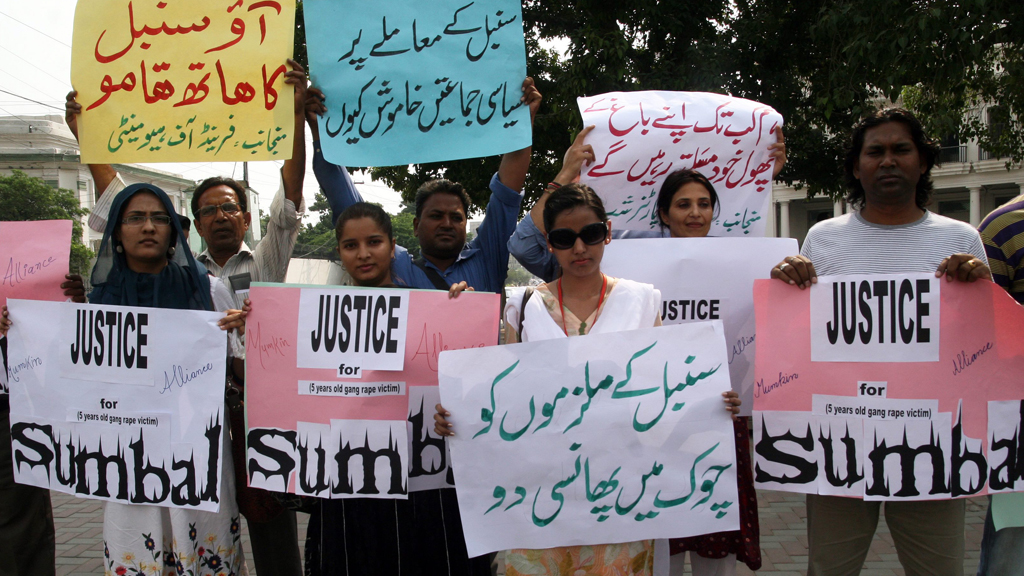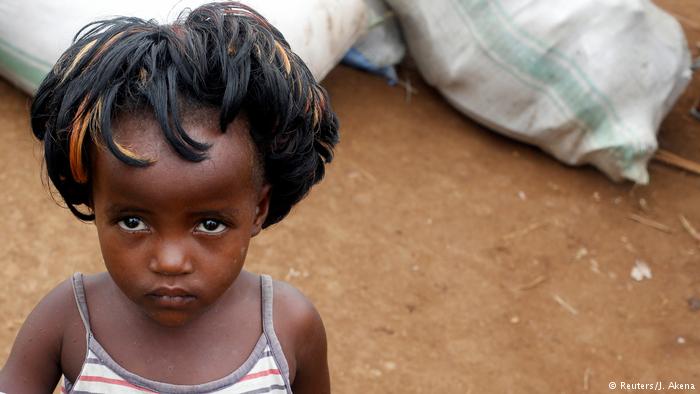Pakistan shaken up after rape of 5-year-old
 The brutal gang rape of a 5 year old girl in Lahore has left Pakistan in a state of shock and dismay. Crimes against women are not uncommon in Pakistan but such a heinous crime against a helpless child raised serious questions about the way the country treats its women and children.
The brutal gang rape of a 5 year old girl in Lahore has left Pakistan in a state of shock and dismay. Crimes against women are not uncommon in Pakistan but such a heinous crime against a helpless child raised serious questions about the way the country treats its women and children.
Crimes against women in Pakistan have been on the rise for some time and after the brutal rape of a five-year old girl, pressure is now mounting on the government to take action. According to a report published in the Express Tribune, over 600 rape cases have been registered with the human rights cell of the law, justice and human rights ministry since 2011. However, the number of reported cases was higher and almost crossed 3,200 during this period. So far virtually nothing has been done to tackle the problem since many Pakistanis continue to believe that rape is a taboo subject.
The civil society’s reaction
Naeem Mirza, Chief operating officer of the Aurat Foundation, an organization that works to promote women rights in Pakistan, believes that this latest rape has shaken Pakistan. “This time, people are positively and openly talking about it, crimes of such nature must be stopped,” he says. After the incident, the country witnessed a wave of protests in big cities such as Peshawar, Lahore, Karachi and Islamabad. “People from various walks of life, students, housewives, and parliamentarians are speaking against this heinous crime”. Mirza says. He also slams the Gender Crime Cell that was established in Islamabad in 2006. Its purpose was to monitor and control offenses against women. “The Gender Crime Cell, which comes under the national police, was given a huge mandate and resources, but it is practically ineffective and most positions are vacant”, he adds.
The police have still not found the perpetrators and there are considerable doubts that they will. The Supreme Court, often the champion of the rule of law in recent years in Pakistan, has taken the initiative and started an investigation. Naeem Mirza says this is a step in the right direction but does not go far enough. “It is a good sign that Supreme Court of Pakistan is taking action against crimes against women, but this particular case needs to be tried in the Anti-terrorist Court, the proceedings should be fast tracked and the perpetrators of this heinous crime must be given severe punishment”, Mirza adds. Although this response is highly emotional, it shows that India’s decision to impose draconian sentences for rape and to fast track rape trials after the death of a young gang rape victim last December is influencing Pakistani thinking.
Farzana Bari, a human rights activist, has no doubt that the debate of the past few days has only scratched the surface of the problem: “Sexual violence against children and women is rampant in Pakistan. There are so many gaps in the legal framework. We don’t even have any law against domestic violence”, she adds. She also stresses the need to keep up the pressure: “Once media attention goes away, everyone forgets, including civil society and the government. It is important that we make sure that until justice is dispensed in this case, we will continue to protest”, she says.
The role of Media
The electronic and print media in Pakistan have covered the story of the rape of the 5-year-old extensively, but coverage has been flawed in terms of international standards because both the victim and the family were named and their privacy violated. Owais Tohid, Executive Director of ARY NEWS, one of the most watched news channels in Pakistan, believes that media coverage is debatable, but emphasises the positives. “The media reported very well about the incident where a 5-year-old girl was ruthlessly and brutally gang raped. It’s been a debate that the media should have withheld the identity of the girl but what is true is that the media, by highlighting this case, is actually highlighting the situation all over Pakistan.”
Syed Talat Hussain, a senior broadcast journalist and columnist in Pakistan, has criticised the reaction of Pakistan’s media in this particular case. “Handling these sensitive cases requires a lot of caution, the intimate details of the crimes should have been tackled properly. Also, the personal details of the girl and her family should have not been broadcast without the explicit permission of the family.”
Despite the differing views on media ethics, it is clear the case has shaken Pakistan to the core and has started a debate which still has some ground to cover. Tohid argues that the young girl has become a symbol and that the media has played a vital role in enabling civil society to debate the issue of women’s rights. “My channel, other news channels and the print media actually stood behind the victim’s family. They are fighting to get justice for this little girl. We are also trying to tell that there should be no stigma attached to the victim. It’s not her fault, it’s the collective crime of the society.” The weeks and months to come could be pivotal for the rights of women and children in Pakistan.
Author: Beenish Javed
Editor: Grahame Lucas
Beenish Javed is a reporter working for ARY News, Islamabad. She has been awarded a two-month long fellowship by the Friedrich Ebert foundation (FES) in Germany and is currently in DW, Bonn. You can follow Beenish on Twitter @Beenishjaved.






